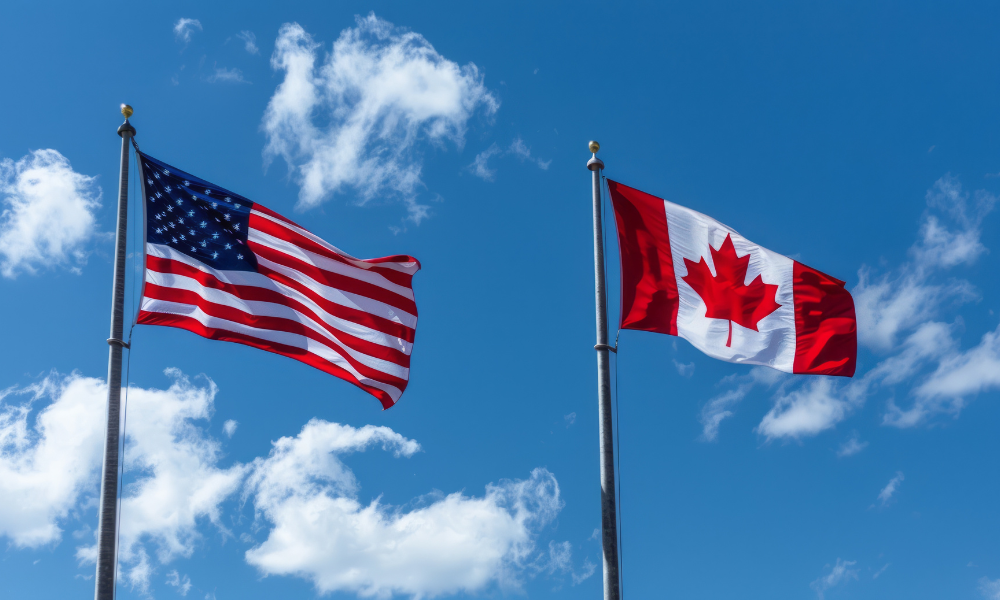US plans new tariffs as Trump warns Canada on NATO contributions and trade dependence

US President Donald Trump signed an executive order on Thursday, establishing reciprocal tariffs that will match the rates other countries impose on US imports.
The order, referred to as the ‘Fair and Reciprocal Plan,’ aims to address trade imbalances by aligning tariff rates between the US and its trading partners, according to Financial Post.
“I have decided for purposes of fairness that I will charge a reciprocal tariff,” Trump said at the signing. “In almost all cases, they are charging us vastly more than what we charge them, but those days are over.”
The White House stated that the administration would evaluate trade relationships and target countries with significant trade surpluses and high tariff rates, as per Reuters.
The measures would also consider non-tariff trade barriers such as industry subsidies, regulatory restrictions, and value-added taxes, which are commonly used in the European Union.
Trump’s tariff plan could have significant implications for Canada.
During a press conference, he said, “Canada’s been very bad to us on trade,” as reported by BNN Bloomberg.
He described Canada as an “interesting situation” and claimed the US does not need Canadian products while Canada depends on American trade for most of its economy.
Trump also reiterated his criticism of Canada’s defence spending, stating, “Canada is … just about the lowest payer in NATO in addition to everything else,” according to Reuters.
Canada has consistently fallen short of the NATO target of spending two percent of GDP on defence, with the Parliamentary Budget Officer projecting spending of 1.37 percent in 2024.
Trump argued that if Canada were a US state, it would receive financial and security benefits.
“Why would we pay US$200bn a year in subsidies to Canada if they’re not a state?” Trump asked, though it remains unclear what the figure refers to.
He added, “Canada is a serious contender to be our 51st state,” as reported by The Canadian Press.
Canadian politicians have responded to Trump’s trade stance.
Manitoba Premier Wab Kinew, who visited Washington, DC, with other provincial leaders, said the trip was successful despite no indication of changes to US tariff plans.
He met with US Secretary of the Interior Doug Burgum and briefly spoke with Tesla CEO Elon Musk, who advises Trump.
Former finance minister Chrystia Freeland, a Liberal leadership candidate, published an op-ed in the New York Times, calling Trump’s proposed tariffs “economic self-mutilation.”
She wrote, “America First need not mean America Alone” and warned that a US-led trade war could force allies to seek new partnerships.
The White House confirmed that reciprocal tariffs would be adjusted for each country and might trigger further trade negotiations, as per Associated Press.
Some experts suggest that developing countries could be most affected, particularly those with high tariff rates on US imports.
Fen Osler Hampson, a professor at Carleton University, compared reciprocal tariffs to “an eye for an eye, a tooth for a tooth,” in an interview with Financial Post.
He said the measures could escalate tensions between the US and trading partners, particularly India, where American imports face higher tariffs than Indian goods entering the US.
Economic analysts have raised concerns that the tariffs could drive up costs for American consumers.
Deutsche Bank estimated that the US weighted average tariff rate could rise from 1.5 percent to 4.8 percent.
The Peterson Institute predicted that Trump’s proposed 25 percent tariffs on Canadian and Mexican goods, along with a 10 percent tariff increase on Chinese imports, could amount to a tax hike of over $1,200 per year for a median American household.
The US Senate confirmed conservative lawyer Brooke Rollins as the new Secretary of Agriculture, Associated Press reported. Given Canada’s significant role in global potash production, her appointment could influence trade discussions.
In 2023, the US imported $4.9bn in potash, with nearly 90 percent coming from Canada, according to Statistics Canada.
Earlier this month, the American Fertilizer Institute urged Trump to exempt Canadian potash from the new tariffs, citing the importance of fertilizer imports for American agriculture.
Meanwhile, a Leger poll found that 81 percent of Canadians have increased or plan to increase their purchases of Canadian-made products in response to US trade actions.
However, only 28 percent of respondents said they were willing to cancel subscriptions to US-based streaming services like Netflix and Disney+.
Trump’s administration continues to review its trade policies, and while no immediate tariffs were imposed, the president’s plan could take effect in the coming weeks.



